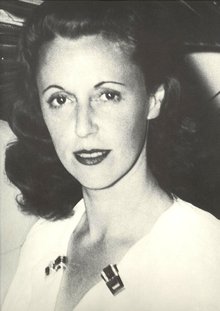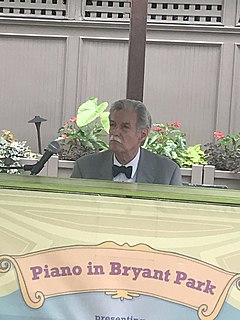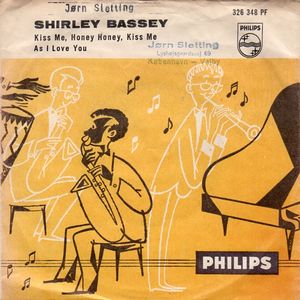
Baroness Kathleen Annie Pannonica de Koenigswarter was a British-born jazz patron and writer. A leading patron of bebop, she was a member of the Rothschild family.

Barry Doyle Harris was an American jazz pianist, bandleader, composer, arranger, and educator. He was an exponent of the bebop style.
South African jazz is the jazz of South Africa.
Baron Jules Adolphe de Kœnigswarter, was a French soldier and diplomat of Jewish descent.

Joel Forrester is an American jazz composer and pianist. He composed the theme song to NPR's Fresh Air, performed by The Microscopic Septet which Forrester founded in 1980 and led with saxophonist Phillip Johnston. A documentary film about Joel Forrester was made in 2014 entitled Embracing Dissonance: A Life in Bebop. The one-hour and five-minute documentary is an exploration of his diverse musical talents and influences. Forrester recounts previously unknown aspects of the life of Thelonious Monk and the Jazz Baroness, Pannonica Rothschild. The film also explores bebop's origins in the Harlem jazz club Minton's, Forrester's work as a composer of African American church music, as an improv accompanist for silent movies, and as a teacher of jazz musical forms. Forrester's story plays out like a jazz tune: a strong theme runs through a series of improvisational changes, solo riffs, and ensemble resolutions to weave the fabric of a bebop life.

Criss-Cross is an album by Thelonious Monk that was released by Columbia; his second for that label. The album consists of previously released Monk compositions that were re-recorded for Columbia by the Thelonious Monk Quartet.

This is a timeline documenting events of Jazz in the year 1964.

This is a timeline documenting events of Jazz in the year 1978.

This is a timeline documenting events of Jazz in the year 1988.

Danish jazz dates back to 1923 when Valdemar Eiberg formed a jazz orchestra and recorded what are thought to be the first Danish jazz records in August 1924. However, jazz in Denmark is typically first dated to 1925, when bandleader Sam Wooding toured in Copenhagen with an orchestra. This was the first time most Danes had heard jazz music. Some prominent early Danish jazz musicians include Erik Tuxen who formed a jazz band and was later named conductor of the Danish Radio Symphony Orchestra; Bernhard Christensen, an art music composer who incorporated jazz elements into his pieces, and Sven Møller Kristensen, who was the lyricist for many of Bernhard Christensen's pieces and who wrote a book on jazz theory in Danish.

A Fickle Sonance is an album by American saxophonist Jackie McLean recorded in 1961 and released on the Blue Note label. It features McLean in a quintet with trumpeter Tommy Turrentine, pianist Sonny Clark, bassist Butch Warren and drummer Billy Higgins.

In the 2000s in jazz, well-established jazz musicians, such as Dave Brubeck, Wynton Marsalis, Sonny Rollins, Wayne Shorter, Jessica Williams, Michael Franks and George Benson, continued to perform and record. In the 1990s and 2000s, a number of young musicians emerged, including US pianists Brad Mehldau, Jason Moran and Vijay Iyer, guitarist Kurt Rosenwinkel, vibraphonist Stefon Harris, trumpeters Roy Hargrove and Terence Blanchard, saxophonists Chris Potter and Joshua Redman, and bassist Christian McBride.

This is a timeline documenting events of Jazz in the year 1921.
Women in jazz have contributed throughout the many eras of jazz history, both as performers and as composers, songwriters and bandleaders. While women such as Billie Holiday and Ella Fitzgerald were famous for their jazz singing, women have achieved much less recognition for their contributions as composers, bandleaders and instrumental performers. Other notable jazz women include piano player Lil Hardin Armstrong and jazz songwriters Irene Higginbotham and Dorothy Fields.
Michael Julien, also known as Peter Warne, was a British songwriter, who was the co-writer of a number of hit songs around the world. He wrote the lyrics of "Let's Live for Today", and co-wrote both "Kiss Me, Honey Honey, Kiss Me", and "Boom Bang-a-Bang", the winning song at the 1969 Eurovision Song Contest. He received an Ivor Novello Award for songwriting. He also practised as a psychotherapist.
Rupert Theophilus Nurse was a Trinidadian musician who was influential in developing jazz and Caribbean music in Britain, particularly in the 1950s.

"Kiss Me, Honey Honey, Kiss Me" is a popular song written by Michael Julien and Al Timothy. It was first recorded by Welsh singer Shirley Bassey and released as a single in 1958 to commercial success. The song was then included on Bassey's album The Bewitching Miss Bassey (1959) and would become one of her most recognisable tunes. It has since been covered by numerous artists.
This is a timeline documenting events of Jazz in the year 1913.
This is a timeline documenting events of Jazz in the year 1910.
This is a timeline documenting events of Jazz in the year 1902.











